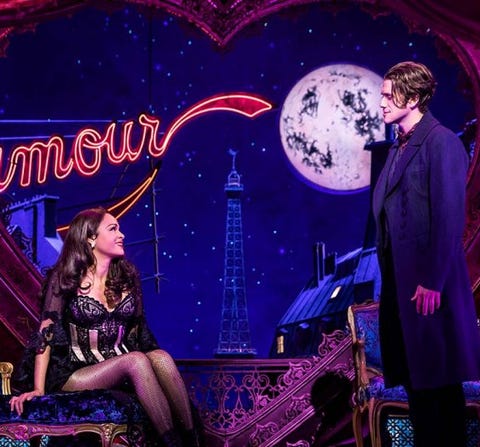Products You May Like
Tony nominees Karen Olivo and Adrienne Warren know what they want—they’re artists with strong convictions. If you buy into racist and misogynistic ideals buried into the industry they worked tirelessly to be a part of, they will confront you head-on and invite you to put in the work to change. This is what they did throughout 2020 and continue to do as Broadway performances gradually resume.
Warren stars in Tina: The Tina Turner Musical and has earned stellar reviews for her portrayal of the legendary singer on Broadway and the West End. She has the voice and moves for the role, but most importantly, she possesses Turner’s indomitable spirit and heart to sell the performance. Warren is using the platform of her second Tony nomination to elevate the Broadway Advocacy Coalition, the nonprofit she co-founded with six other artists in 2016 that advocates for students, artists, organizations, and communities to use the arts for social change. Their work became even more vital and visible after the murders of George Floyd and Breonna Taylor, and the ongoing pandemic.
Olivo, who commanded the stage as Satine, the glamorous courtesan in the stage adaptation of Baz Luhrmann’s Moulin Rouge!, is also using their platform for advocacy. They vowed in June 2020 that they wouldn’t lend their artistic services to Trump supporters when they discovered that a prominent person in the industry had donated a large sum of money to his campaign, and another had donated money to Republican Senator Roy Blunt’s campaign. The revelation drove Olivo to co-found the nonprofit AFECT (Artists for Economic Transparency) with fellow Broadway star Eden Espinosa.
“It became a calling. We didn’t make those vows thinking that we would start a nonprofit; we made that vow saying that we will never make money for people who would knowingly support candidates who would undermine our civil rights,” Olivo reveals.
Olivo has embraced the activist label ever since their Broadway debut in Rent back in 1996, when they advocated for their castmates with union representatives—but it still isn’t an easy one to carry. “Most people who have been successful have been compliant in some way; the thing that has been tugging at me inside is something that I have to put into practice every single day,” Olivo says, adding that “it can’t be something that [they] do some of the time. It has to be the things that [they] do in general.”
When I interview Olivo and Warren in late 2020, their energy feels like pain meeting a long-awaited catharsis. “There is power in telling the stories of those directly affected by oppressive systems in our society,” Warren says. “There is power because in telling those stories; you are invoking empathy. As an artist, I want my audience to be changed, to look at things with a more critical and empathic eye. At that moment, whatever art is being consumed has the power to change someone’s life, their perspective, and their thoughts, which later informs their actions. That audience member could be a judge, lawyer, student, police officer, doctor, or teacher. That is the power to change legislation, action, careers, judgments, and even a syllabus for a class.”
And this brings us to the current reckoning, propelled by the ongoing pandemic and protests against racial injustice across different industries. The Tony nominations hit differently in 2020 as they arrived during Broadway’s 18-month hiatus. They also coincided with crucial conversations about systemic racism when legacy institutions, like the American Theatre Wing, which administers the Tonys, have had their long share of it.
“We have all been through so much during this time. I hope Broadway doesn’t ‘come back’ but rather ‘moves forward’ towards becoming a more equitable, safe, and inclusive institution,” Warren says. Olivo is quick to point out that organizations are working very hard to figure out how to restructure the industry’s inner-workings. Still, it’s vital that they find ways to make theater more sustainable and “create a safety net for all of these different businesses that are reliant on the live theater industry.”
The performers were undeterred by the fact that they didn’t know how to start a nonprofit organization. Olivo remembers having a conversation with Espinosa after the murders of George Floyd and Breonna Taylor, and it came to them at the heels of their pledge. “We were feeling so much anxiety, and knew that, aside from going to protest and donating, there was something else that we had to do.” Warren similarly recalls, “I bought books, asked friends, did whatever I could to educate myself. I don’t think any of us had any idea where it might go; we just saw a void and wanted to fill it. So we did. First, we needed money. Because we were all artists, we were all working on different schedules.”
Despite their organizations’ humble beginnings, the impact has been significant. Last summer, Warren’s Broadway Advocacy Coalition hosted Broadway for Black Lives Matter Again, a forum that allowed Black industry members to share their experiences with racism, access self-care resources, and identify the tools of unlearning the effects of systematic oppression, while also allowing white allies to examine their biases and sign an accountability pledge. Her goal behind the event was not only to listen, but also to guide—and it caught on. In fact, the coalition is now in a multi-year partnership with Columbia Law School. This spring, artists and law students had the opportunity to collaborate during the semester-long course “The Theater for Change: Reimagining Justice Through Abolition.”
AFECT has become known as a source for insight from other theater professionals, and a site to learn about the minimum investment for a Broadway show, the difference between nonprofit theaters and for-profit ones, and minimum yearly salaries in the industry. Olivo and Espinosa are both educators who understand that not everyone can afford tickets to a Broadway show, so they want to use their know-how to explain why tickets are so expensive and empower consumers to question what they’re buying into. Olivo tells ELLE.com that they’ve been educating students outside AFECT at the collegiate level at the University of Cincinnati College-Conservatory of Music and middle and high schoolers.
With the 2020 Tony Awards ceremony rescheduled for Sunday, Sept. 26, Olivo and Warren are thankful that their performances will finally be recognized, even months after the original nomination announcement. Both know firsthand that a Tony nod or win can lead to a wealth of job opportunities and isn’t something you earn alone. “A nomination specifically for me means that A.J. Littlefield, my dresser, and Daniel Mortenson, our Hair and Makeup Supervisor, the people who are with me every step of the way, are also highlighted, and they never are, as well as my standby Ashley Loren. I couldn’t do my job if it weren’t for her,” Olivo confesses. But while it would be an excellent opportunity—not to mention a a watershed moment—to celebrate these extraordinary BIPOC artists’ performances, the actors agree that the moral responsibility they have to their audience takes precedence over any award.
Since our interview, Olivo announced they will not return to Moulin Rouge! The Musical this September and has used their departure to denounce the industry’s silence on the alleged abuse perpetrated by stage and film producer Scott Rudin. (Rudin isn’t involved in Moulin Rouge!) They will instead continue to build the industry they hope to see. Warren, on the other hand, pledged during a May 2021 Broadway United For Racial Justice rally to not sign a Broadway contract until producers share more specifics on how they’ll address racism and create initiatives that support inclusivity and intersectionality and amplify BIPOC voices. In July, she announced she’ll return to Tina for a limited engagement. The American Theatre Wing has also taken note of the Broadway Advocacy Coalition’s efforts and will award the organization with an honorary Tony.
While Warren is demanding to be seen and heard, she also wants others to do the same, even if they feel the system doesn’t work in their favor. “I encourage everyone: If you want to make change happen, don’t wait, do it. There are so many people rooting and waiting for you.”
This content is created and maintained by a third party, and imported onto this page to help users provide their email addresses. You may be able to find more information about this and similar content at piano.io


